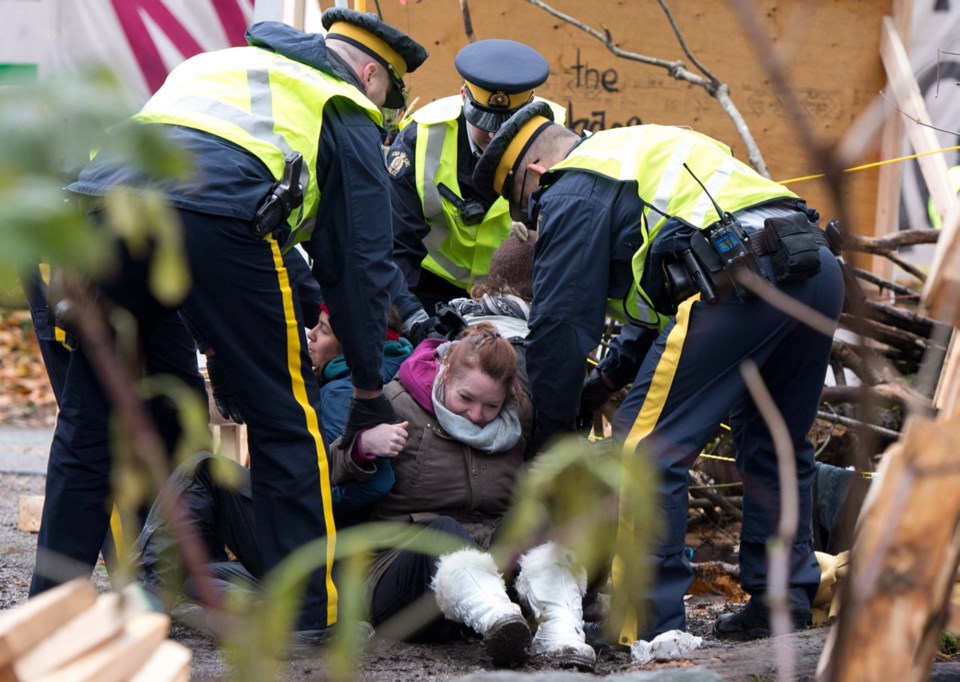The National Energy Board’s review of Kinder Morgan’s proposed pipeline project is “fatally flawed,” say 12 B.C. First Nations in an open letter to the federal government.
“We’ve been invisible on our land for far too long and this process perpetuates that void by not allowing cross-examination,” said Ian Campbell, chief of the Squamish Nation. He spoke outside the Victoria Conference Centre Friday, where the National Energy Board was hearing its last day of oral evidence from First Nations groups.
The 12 include two Island First Nations: the T’Sou-ke from the Sooke area and the Tsawout from the Saanich Peninsula.
Since Monday, the federal regulatory tribunal has heard from representatives of Island First Nations who gave examples of how they would be directly affected by the Trans Mountain expansion, which would see 990 kilometres of new pipeline laid to carry crude oil from northern Alberta to B.C.’s coast for export by tanker ships.
In the open letter, First Nations say they were not consulted about the framework for the review process and expressed concern that the environmental assessment will not consider adverse impacts on aboriginal title and treaty rights.
The groups also said Kinder Morgan’s evidence will not be cross-examined but addressed through written questions, “which have proven to be a wholly inadequate substitute,” the letter said.
Pipeline opponents have expressed fears about how building the pipeline will disturb the environment, and about leaks on land and at sea.
Carleen Thomas of the Burrard Inlet-area Tsleil-Waututh Nation said First Nations groups are participating in the hearing process “under duress, under protest.”
“It’s not anymore about a pipeline,” Thomas said. “What it’s become is an attack on our collective democratic rights.”
The letter was addressed to Natural Resources Minister Greg Rickford and Prime Minister Stephen Harper.
Sarah Kiley, a spokeswoman for the National Energy Board, said the board has heard from dozens of First Nations groups over the last three months in Victoria, Edmonton, Chilliwack and Kamloops.
“We feel that the information we’re getting from First Nations groups is going to be very, very helpful as we come to our recommendations for the federal government. We have not come to a decision or recommendation yet,” Kiley said.
Kiley said it’s unfortunate First Nations groups feel the process is flawed. “We would like to assure anyone who has that concern that our minds are open and we are still reading and listening to evidence.”
A spokeswoman for the Ministry of Natural Resources said the federal government is fulfilling its legal duty to consult with groups affected by the proposed pipeline project. “The NEB process allows for the perspectives of aboriginal groups to be communicated both in writing and through participation in oral hearings,” Jacinthe Perras said in an email.
On Thursday, a judge threw out civil contempt charges against dozens of activists who were arrested while protesting Kinder Morgan’s drilling work related to the pipeline expansion.
About 100 people were arrested and faced civil contempt charges for violating a court injunction ordering them to keep away from two Burnaby Mountain drilling sites. But the company provided incorrect GPS co-ordinates when it initially sought the court injunction. At one location, co-ordinates were so inaccurate that the work site was entirely outside the area covered by the injunction.
Texas-based Kinder Morgan’s request to extend the injunction beyond Dec. 1 was denied.
— With files from the Canadian Press
> Kinder Morgan moving off Burnaby Mountain, B1



